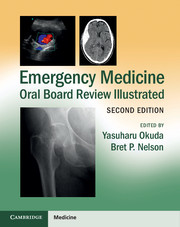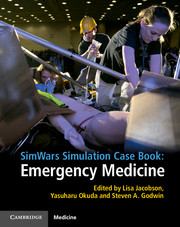49 results
Index
-
- Book:
- Emergency Medicine Oral Board Review Illustrated
- Published online:
- 05 May 2015
- Print publication:
- 21 May 2015, pp 617-628
-
- Chapter
- Export citation
Section Editors
-
- Book:
- Emergency Medicine Oral Board Review Illustrated
- Published online:
- 05 May 2015
- Print publication:
- 21 May 2015, pp xi-xi
-
- Chapter
- Export citation
Appendices
-
- Book:
- Emergency Medicine Oral Board Review Illustrated
- Published online:
- 05 May 2015
- Print publication:
- 21 May 2015, pp 610-616
-
- Chapter
- Export citation
Cases
-
- Book:
- Emergency Medicine Oral Board Review Illustrated
- Published online:
- 05 May 2015
- Print publication:
- 21 May 2015, pp 37-551
-
- Chapter
- Export citation
Appendices
-
- Book:
- Emergency Medicine Oral Board Review Illustrated
- Published online:
- 05 May 2015
- Print publication:
- 21 May 2015, pp 552-554
-
- Chapter
- Export citation
Appendices
-
- Book:
- Emergency Medicine Oral Board Review Illustrated
- Published online:
- 05 May 2015
- Print publication:
- 21 May 2015, pp 581-585
-
- Chapter
- Export citation
Table of Contents
-
- Book:
- Emergency Medicine Oral Board Review Illustrated
- Published online:
- 05 May 2015
- Print publication:
- 21 May 2015, pp vii-x
-
- Chapter
- Export citation
Chapter 3 - About the Oral Boards: The approach and practical tips
-
-
- Book:
- Emergency Medicine Oral Board Review Illustrated
- Published online:
- 05 May 2015
- Print publication:
- 21 May 2015, pp 19-25
-
- Chapter
- Export citation
Case 21: - Abdominal pain
- from Cases
-
-
- Book:
- Emergency Medicine Oral Board Review Illustrated
- Published online:
- 05 May 2015
- Print publication:
- 21 May 2015, pp 115-119
-
- Chapter
- Export citation
Copyright page
-
- Book:
- Emergency Medicine Oral Board Review Illustrated
- Published online:
- 05 May 2015
- Print publication:
- 21 May 2015, pp iv-iv
-
- Chapter
- Export citation
Appendices
-
- Book:
- Emergency Medicine Oral Board Review Illustrated
- Published online:
- 05 May 2015
- Print publication:
- 21 May 2015, pp 567-569
-
- Chapter
- Export citation
Appendices
-
- Book:
- Emergency Medicine Oral Board Review Illustrated
- Published online:
- 05 May 2015
- Print publication:
- 21 May 2015, pp 562-566
-
- Chapter
- Export citation
Appendices
-
- Book:
- Emergency Medicine Oral Board Review Illustrated
- Published online:
- 05 May 2015
- Print publication:
- 21 May 2015, pp 586-609
-
- Chapter
- Export citation
Contributors
-
- Book:
- Emergency Medicine Oral Board Review Illustrated
- Published online:
- 05 May 2015
- Print publication:
- 21 May 2015, pp xii-xiv
-
- Chapter
- Export citation
Preface
-
- Book:
- Emergency Medicine Oral Board Review Illustrated
- Published online:
- 05 May 2015
- Print publication:
- 21 May 2015, pp xv-xvi
-
- Chapter
- Export citation
Appendices
-
- Book:
- Emergency Medicine Oral Board Review Illustrated
- Published online:
- 05 May 2015
- Print publication:
- 21 May 2015, pp 555-561
-
- Chapter
- Export citation
Appendices
-
- Book:
- Emergency Medicine Oral Board Review Illustrated
- Published online:
- 05 May 2015
- Print publication:
- 21 May 2015, pp 570-580
-
- Chapter
- Export citation
Dedication
-
- Book:
- Emergency Medicine Oral Board Review Illustrated
- Published online:
- 05 May 2015
- Print publication:
- 21 May 2015, pp v-vi
-
- Chapter
- Export citation

Emergency Medicine Oral Board Review Illustrated
-
- Published online:
- 05 May 2015
- Print publication:
- 21 May 2015

SimWars Simulation Case Book: Emergency Medicine
-
- Published online:
- 05 February 2015
- Print publication:
- 15 January 2015



